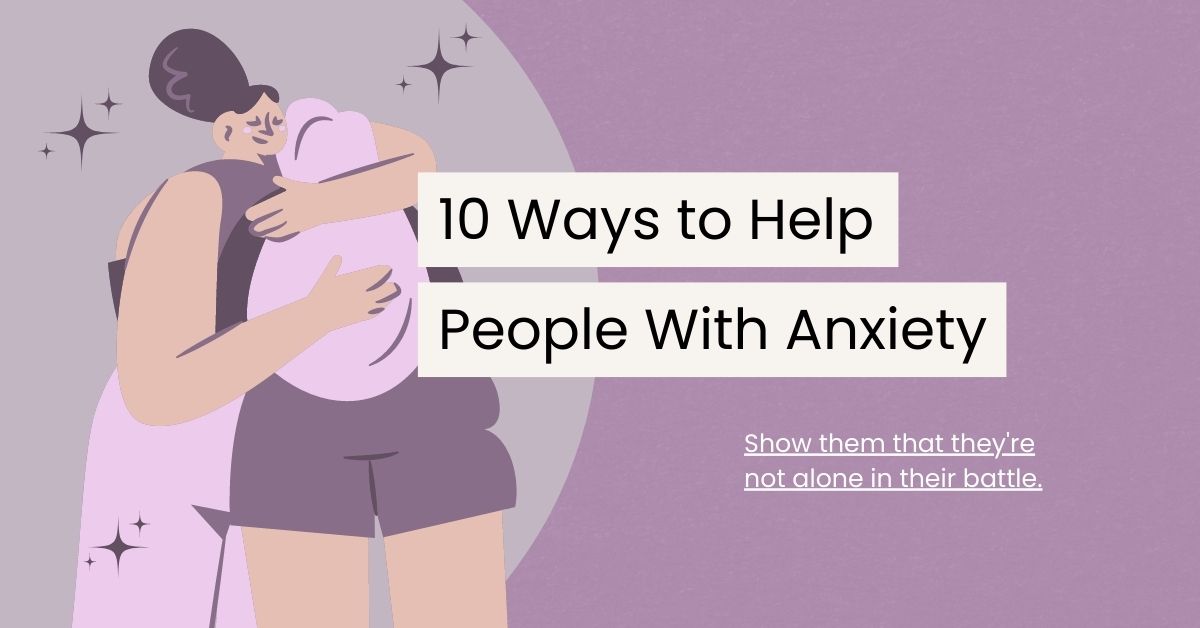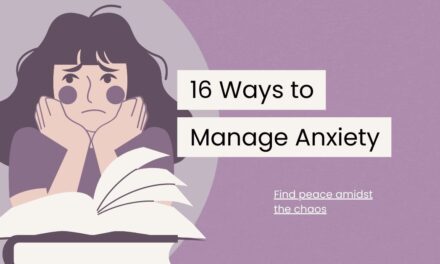Last Updated on July 31, 2023
Anxiety, that knot in your stomach, the racing heart, the constant worry that something bad will happen. We’ve all experienced it at some point. But for some people, anxiety can become overwhelming, affecting their daily lives and relationships. As a friend, family member, or partner, you have the power to make a significant difference in their journey.
In this blog post, we’ll explore ten tips for helping someone with anxiety and showing them that they’re not alone in their battle.
Helping Someone With Anxiety Through 10 Simple Ways
#1. Educate Yourself about Anxiety
Helping someone with anxiety can be a lot easier if you are well-informed. By familiarizing yourself with various aspects of anxiety, you can develop a deeper understanding of your loved one’s experiences and challenges. Here are some practical tips and examples to help you on this journey:
- Know the Basics: Learn about anxiety disorders like social anxiety and panic attacks. It will help you understand what they’re going through.
- Spot the Signs: Recognize anxiety symptoms like restlessness, worry, or avoiding certain situations.
- Be Mindful of Triggers: Understand what makes their anxiety worse, like stress or social events.
For example: Let’s say your friend has been experiencing heightened anxiety levels, and you notice they avoid attending social gatherings. By understanding social anxiety disorder, you can approach them with empathy and suggest alternative ways to support their social needs, such as attending smaller group outings or offering to accompany them to events.
Overall, educating yourself about anxiety is the first step towards being a compassionate and effective support system.
#2. Be a Good Listener
When anxiety strikes, sometimes all a person needs is a listening ear. Here’s how you can be there for them in a meaningful and compassionate manner:
- Create a Safe Space: Make it clear that you are there to listen and that they can share their feelings without any fear of judgment. Offer your undivided attention and a non-judgmental environment where they can freely express themselves.
- Practice Active Listening: Focus on what they’re saying without interrupting or planning your response. Maintain eye contact, nod, and use verbal cues like “I see” or “Tell me more” to show that you are actively engaged.
- Offer Validation: Let them know that their emotions are valid and understandable. Avoid dismissing their feelings or telling them to “just relax.” Show empathy and understanding, even if you might not fully comprehend their experiences.
- Avoid Giving Unsolicited Advice: Refrain from jumping in with quick fixes or offering solutions unless they specifically ask for advice. Sometimes, people just need someone to listen and empathize with their feelings.
- Be Patient and Avoid Judgment: Anxiety can be complex, and your loved one may express their feelings in various ways. Be patient and avoid judging their emotions or reactions.
- Follow Up and Check-In: Remember to follow up on previous conversations and check how they are doing. Let them know that you are available whenever they want to talk.
Being a good listener is not about having all the answers. It’s about offering your support, empathy, and understanding. By creating a safe space and actively listening without judgment, you can make a significant difference in their anxiety journey. Remember, your presence and willingness to listen can be a tremendous source of comfort and strength for your loved one.
#3. Offer Reassurance and Validation
Imagine feeling like your emotions are irrational and out of control. Your loved one might be experiencing this every day. Offering reassurance and validation is a powerful way to comfort someone with anxiety. Here’s how you can make a meaningful difference in their life by providing understanding and support:
- Normalize Their Emotions: Let them know that feeling anxious is a common human experience. Remind them that it’s okay to have these emotions and that they are not alone in their struggles.
- Acknowledge Their Feelings: Show empathy by acknowledging their emotions. Avoid dismissing their concerns or telling them to “snap out of it.”
- Be Their Support System: Reassure them that you are there for them through the ups and downs. Offer your unwavering support, knowing that they can rely on you during difficult times.
- Avoid Minimizing Their Concerns: Be cautious about making statements like “It’s not a big deal” or “You’re making a fuss over nothing.” Such comments can undermine their feelings and cause them to withdraw.
- Show Unconditional Support: Let them know that you accept them as they are, anxiety and all. Your support is not contingent on them “getting better” but on being there for them through thick and thin.
By offering reassurance and validation, you can be a constant source of comfort for your loved one with anxiety. Your understanding and support can make a world of difference in helping them navigate their emotions and feel supported in their journey to managing anxiety effectively.
Remember, a little empathy can go a long way in building trust and strengthening your relationship with them.
#4. Learn their Triggers and Boundaries
Each person’s anxiety is unique, with specific triggers and boundaries. Understanding them is essential for helping someone with anxiety. Here’s how you can create a safe and supportive environment by learning about what affects them the most:
- Listen and Observe: Pay attention to their behaviors and reactions during various situations. Listen to their experiences and feelings to identify potential triggers.
- Have Open Conversations: Encourage open communication about their anxiety triggers and boundaries. Create a safe space for them to share their feelings without judgment.
- Respect Their Comfort Zones: Understand that everyone has different comfort levels, and pushing them beyond their limits may exacerbate their anxiety.
- Be Mindful of Specific Triggers: Some triggers may be obvious, while others might be more subtle. Be aware of potential triggers that might worsen their anxiety.
By learning their anxiety triggers and respecting their boundaries, you can create a safe and supportive space for them. Remember, your willingness to be patient and empathetic will foster trust and strengthen your relationship, allowing them to open up about their anxiety and feel supported in their quest for emotional well-being.
#5. Encourage Self-Care
Encouraging self-care is a vital aspect of helping someone with anxiety. By prioritizing their well-being and assisting them in finding relaxation techniques, you can empower them in their journey to manage anxiety. Here’s how you can be a guiding force in promoting self-care:
- Emphasize the Importance of Self-Care: Help them understand that taking care of themselves is not selfish but necessary for managing anxiety effectively. Highlight the positive impact of self-care on their mental and emotional well-being.
- Explore Various Self-Care Activities: Discuss different self-care options with them and encourage them to explore what resonates best with their needs and preferences.
- Be a Supportive Companion: Offer to engage in self-care activities together, making it a shared experience. Your presence can provide comfort and motivation as they try new self-care methods.
- Provide Resources: Share articles, books, or apps related to self-care and anxiety management. Point them towards reputable sources that offer guidance and tips.
By encouraging self-care, you empower your loved one to take charge of their anxiety management. Understanding the importance of self-care and finding what techniques work best for them will lead to greater emotional resilience and overall well-being. Your support in this journey will demonstrate that you are there for them every step of the way.
#6. Be Patient and Understanding
Recovery from anxiety is a journey that may not have a quick fix. Being patient and understanding is crucial when supporting someone on their anxiety journey. Recovery may not happen overnight, so here’s how you can provide unwavering support and encouragement:
- Set Realistic Expectations: Recognize that managing anxiety takes time and effort. Avoid expecting immediate results or pushing for quick fixes.
- Celebrate Small Victories: Acknowledge and celebrate even the smallest steps they take in managing anxiety. Every accomplishment, no matter how minor, is a meaningful milestone.
- Encourage Self-Compassion: Remind them to be kind to themselves throughout their anxiety management journey. Encourage self-compassion during times of difficulty.
- Be Patient with Setbacks: Recognize that setbacks are a normal part of the process. Avoid expressing disappointment or frustration and be supportive during difficult moments.
By being patient and understanding, you create a supportive and nurturing environment for your loved one. Remember, it’s the little steps and your unwavering support that can make all the difference in their path to healing and managing anxiety effectively.
#7. Accompany Them to Seek Professional Help
Accompanying your loved one to seek professional help is an essential aspect of being a supportive presence in their anxiety journey. Here’s how you can offer assistance and encouragement:
- Acknowledge the Importance of Professional Help: Help them understand that seeking professional guidance is a positive and brave step towards managing their anxiety effectively.
- Assist in Finding a Therapist or Counselor: Offer to help them research and find a suitable mental health professional based on their needs and preferences.
- Accompany Them to Appointments: If they are hesitant about attending appointments alone, offer to go with them. Your presence can provide added encouragement and emotional support.
- Be Patient and Non-Judgmental: Understand that therapy can be a vulnerable experience. Be patient and avoid judgment, allowing them to process their emotions at their own pace.
By supporting your loved one in seeking professional help, you show them that they don’t have to face anxiety alone. Remember to be patient, understanding, and respectful of their privacy as they embark on this journey towards greater well-being.
#8. Be Mindful of Language
Being mindful of your language is crucial when helping someone with anxiety. Here’s how you can use words that uplift and validate their feelings:
- Choose Supportive Language: Opt for words that convey empathy and understanding. Use phrases that show you’re there for them and that you believe in their ability to overcome anxiety. For example: Instead of saying, “Just relax,” say, “I’m here to support you through this. You can handle it.”
- Avoid Minimizing Their Feelings: Steer clear of phrases that might unintentionally dismiss their emotions or experiences. Avoid saying things like “It’s not a big deal” or “You’re overreacting.”
- Be Mindful of Assumptions: Avoid making assumptions about their anxiety or jumping to conclusions about the root causes of their feelings.
- Validate Their Emotions: Let them know that it’s normal to experience anxiety and that their feelings are valid. Avoid telling them to “snap out of it.”
- Use Inclusive Language: Create a sense of unity by using “we” and “us” instead of “you” and “I.” It fosters a feeling of togetherness in facing anxiety. For example: Instead of saying, “You have to deal with this alone,” say, “We’ll navigate this together and find ways to cope.”
By being mindful of your language, you create a supportive and nurturing atmosphere for your loved one with anxiety. Remember, your supportive language can be a source of comfort and strength as they work towards managing anxiety effectively.
#9. Be a Source of Stability
Being a source of stability is invaluable when helping someone with anxiety. Here’s how you can be an anchor for your loved one during their turbulent times:
- Offer Consistent Support: Be there for them consistently, demonstrating your commitment to supporting them through their anxiety journey.
- Be Reliable and Dependable: Show them that they can rely on you in times of need. Follow through on your commitments and be dependable in your actions.
- Offer Reassurance: Remind them that they are not alone and that you will be there to support them through thick and thin.
- Be Present: Be fully present when spending time with them, giving your undivided attention and actively listening.
By being a source of stability, you provide your loved one with a firm foundation to navigate their anxiety. Remember, your steady presence and unwavering support can make a significant difference in their journey towards managing anxiety effectively.
#10. Know When to Seek Help for Yourself
Helping someone with anxiety is crucial but you should also know when to seek help for yourself. Here’s how you can take care of your own well-being and be the best support system possible:
- Recognize Your Limits: Acknowledge that helping someone with anxiety can be emotionally demanding. Be aware of when you start feeling overwhelmed.
- Set Boundaries: Establish boundaries to protect your own well-being. Be clear about what you can and cannot handle as a support system.
- Reach Out to Friends and Family: Lean on your own support network for understanding and encouragement. Sharing your experiences can be comforting and validating.
- Engage in Self-Care: Prioritize self-care to recharge and prevent burnout. Make time for activities that bring you joy and relaxation.
- Seek Professional Guidance: If you find that supporting your loved one is impacting your mental health significantly, consult a mental health professional for guidance.
Remember, taking care of yourself is essential to be an effective support system for your loved one. Taking the time to prioritize your well-being ultimately benefits both you and the person you are supporting in managing anxiety effectively.
Final Thoughts on Helping Someone With Anxiety
Being supportive of someone with anxiety requires understanding, empathy, and patience. By educating yourself about anxiety, listening attentively, and offering validation, you create a nurturing environment for your loved one.
Remember, seeking professional help when needed is essential, and don’t forget to take care of your well-being too. Together, you can make a significant difference in their anxiety journey and show them that they are not alone. Start by being there for them today and being the supportive presence they need.






